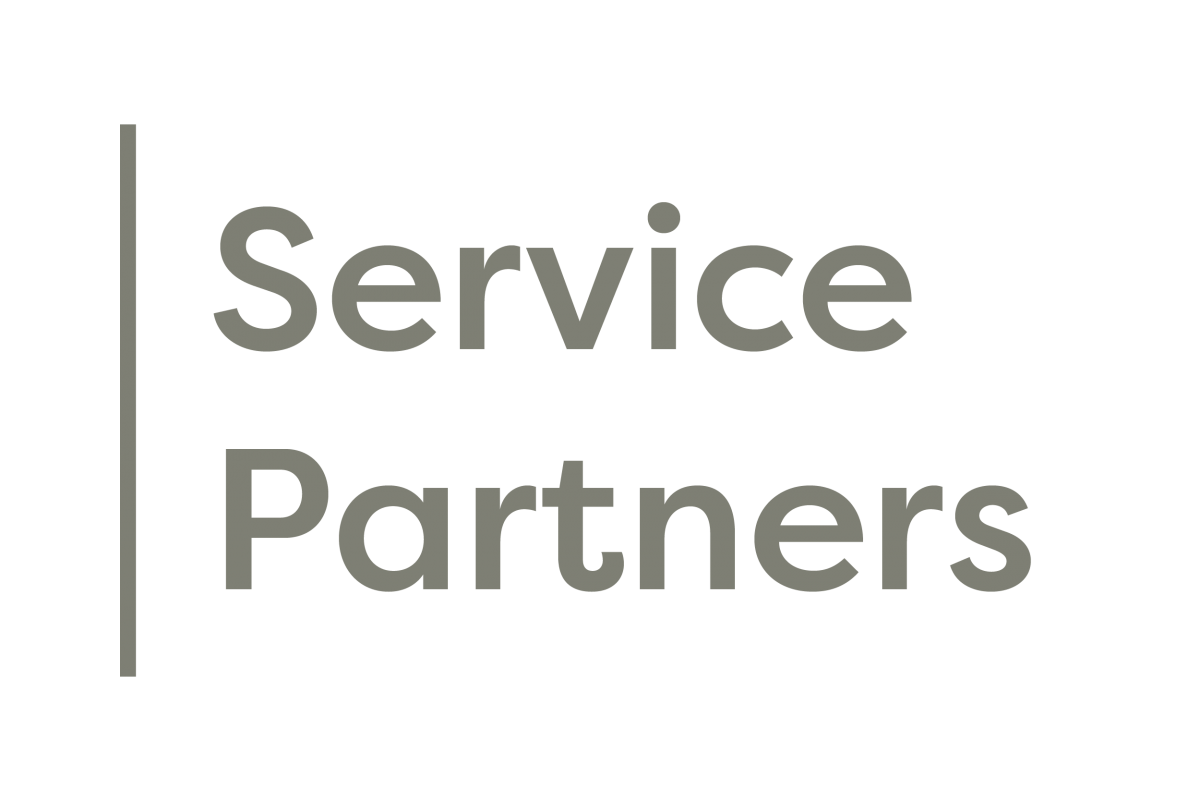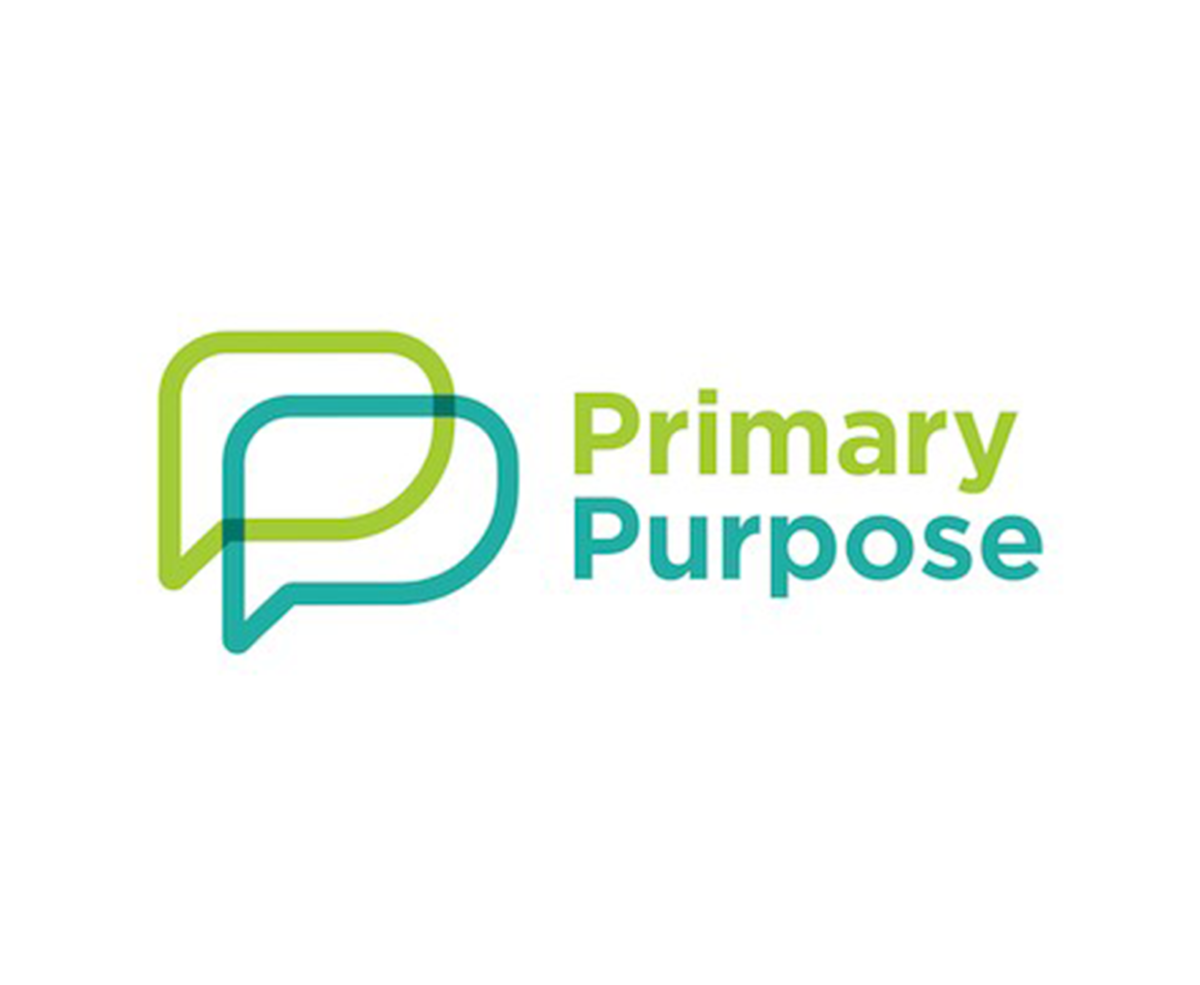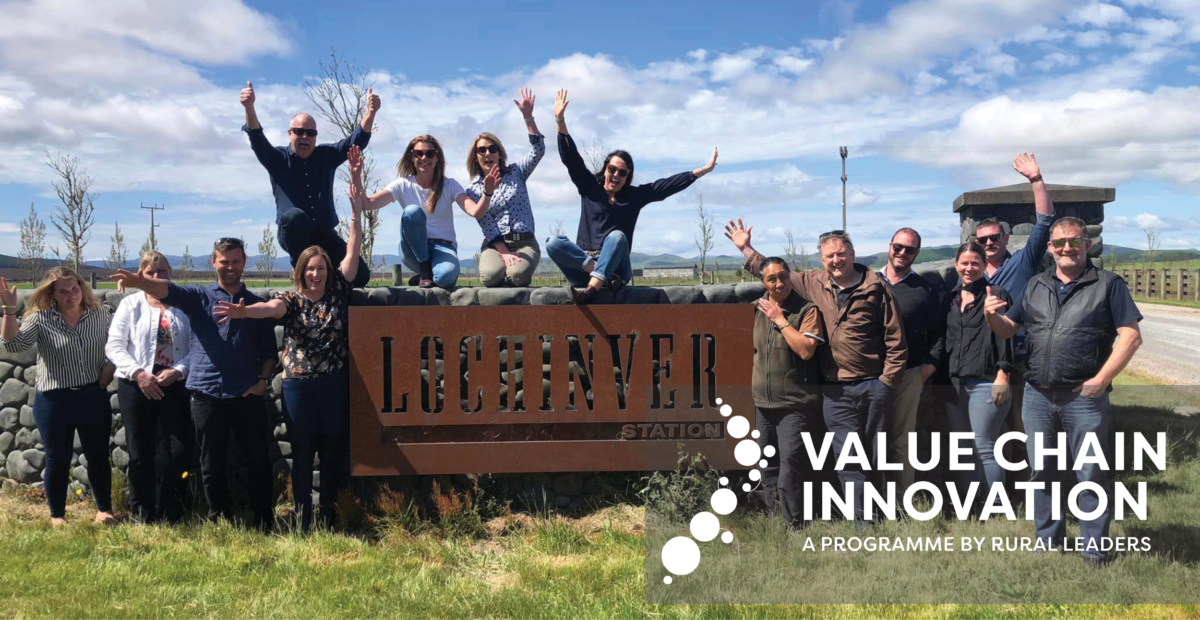
Just over two weeks ago a group of people from across New Zealand came together in Auckland for a week of visits to operations within four key value chains – Dairy, Red Meat, Apple and Kiwifruit.
Any one of the twenty-two Value Chain Innovation Programme visits seen in isolation, would generate plenty of ‘aha moments’. To run four value chains in their entirety was quite something else. It’s what makes this programme work so remarkably well.
The level of access to the leaders, founders, operators met on the Programme created the feeling you were often being ‘let in’ on some extraordinary insights. This made possible by the understanding that Chatham House Rules apply.
In this article we share ‘field notes’ from the perspective of the people who were there.
Jesamine Wanoa, also wrote a post a day while on the Programme and offers her unique perspective as a specialist grower of native NZ plants and owner-operator of Tangikaroro Native Nursery.
Rachel Baker, was one of the four 2024 Nuffield Scholars on the Programme. We share her post-programme post. Rachel is a Farmer and Portfolio Manager of MyFarm Investments’ Hawke’s Bay apple syndicates.
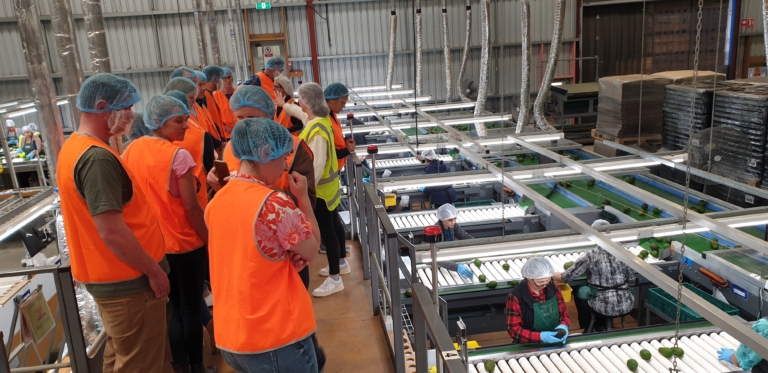
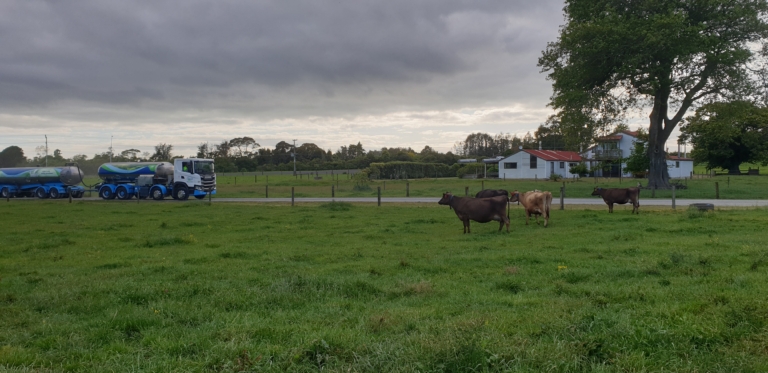
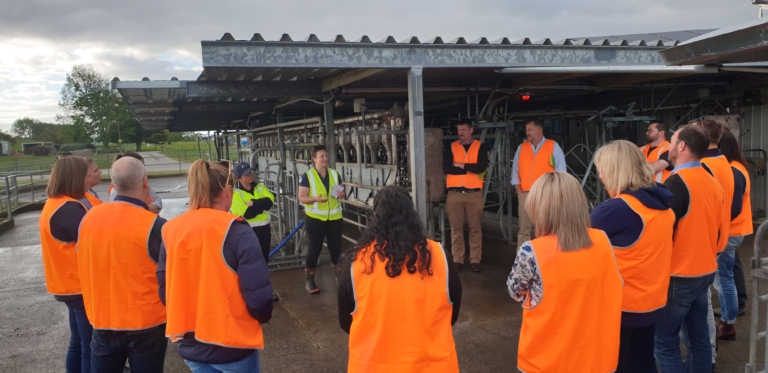
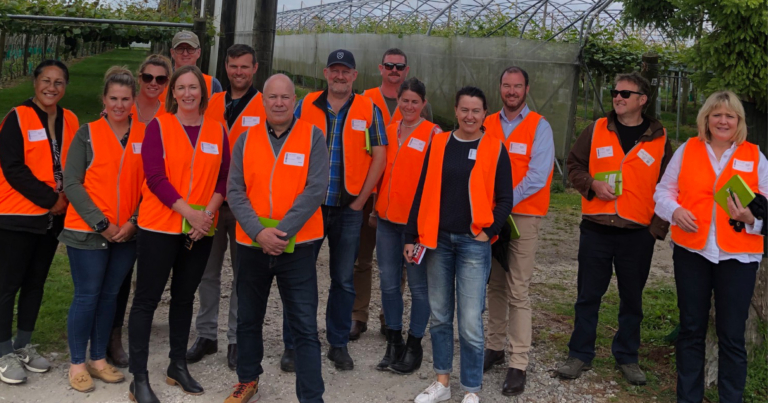
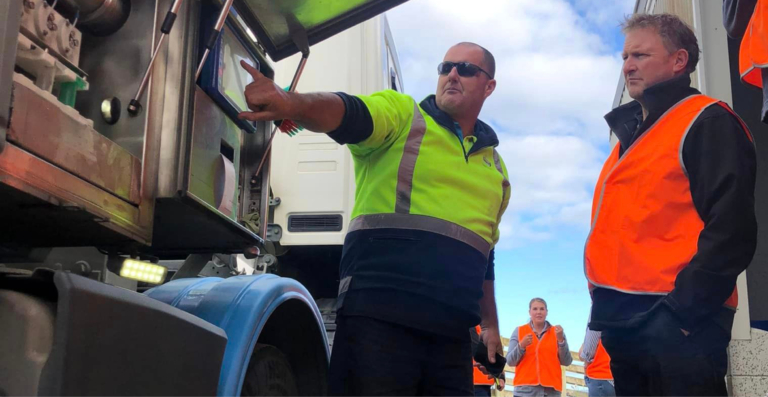

12.11.23
Day 1 – Jesamine Wanoa:
Good first day, departing at 1pm from Auckland Airport to Hamilton.
Instantly connected with two Ngāi Tahu women, and enjoyed deepening my understanding of the three disciplines of value chain models, and seeing the potential for where Ngāti Porou might adapt a model to suit our purposes. A good overall general structural framework for navigating this journey with.
Thank you Hamish and Phil for both leading and Co-facilitating, and Matt and all my colleagues on this journey with me. What a talented bunch!
I’m so excited to finally be here growing our network and understanding together. Thank you my whanau back in Te Araroa and in Tuwakamana for this opportunity.
13.11.23
Day 2 – Jesamine:
Visited Te Rapa Farm (Fonterra Farm Source) and witnessed milk testing technology at Fonterra today, as well as cheese and dry milk powder production. Then visited the cold store facility prior to export. Every truck bringing in product must meet a standard of cleanliness! Amazing 40 ton forklifts that lift 28 ton crates.
Additional field notes:
First stop was a Fonterra Farm Source working dairy unit, where new on-farm technologies and innovation are trialled for wider rollout.
We explored MilkTestNZ, where milk samples from 10,000 dairy farms are tested every day in a remarkable feat of logistics and efficiency.
Then we moved to Fonterra’s impressive distribution centre, to LIC and DairyNZ where senior leaders spoke with us directly. And the NZ cream on top – a visit to Zenders Cafe, run by three sisters who grew up on a Dutch dairy farm.
14.11.23
Day 3 – Jesamine:
I was very impressed with our host Hayden’s approach. Hayden works with Robotics Plus. The ability of Robotics Plus to recognise where their strengths lie in solving problems, helps them then play between the flags of those strengths, to produce customer-focused solutions.
Their model allows for collaboration with other partners, who hold expertise in other areas of the value chain outside these flags, to create a solution fit for purpose to meet the client’s needs. Ka mau te wehi!
My take-away from this visit, is that it’s critical to customer trust and confidence to be transparent about what you’re skilled in, and then decide what components for the solution should be out-sourced to business partners who are better positioned to meet those requirements.
This collaborative approach towards knowledge sharing to solve the customer’s problem, allows business partners to use their unique skillsets to support you and your customer’s business, and vice-versa.
This model is so efficient and utilises a strong collaborative network approach that puts the customer at the centre – and is future focused. Everyone on the workshop floor understands that culture from apprentice to Manager. Everyone has genuinely taken ownership of their part in the value chain, creating an incredibly innovative and creative work environment that’s a safe space for developing their talent.
After Robotics Plus, the Ports of Tauranga. The volume and variety of export that goes through this space is mind boggling! It requires every individual on-site to be committed to best practice in terms of biosecurity and health and safety.
There are layer upon layer of control measures needed, not just to keep you safe on this extremely busy port, but to keep you alive! We saw here the forestry logs, and the automated Robotic Plus technology used, to measure each log’s length, diameter and therefore weight.
The next visit was at Zespri, who have shifted over time from being supported by government entities, to now leading and supporting our government on the international stage. Such is the success of their approach, which is thorough but future focused, with the consumer always front of mind.
Also invited to speak were KVH (Kiwifruit Vine Health), who focus on NZ’s biosecurity response. KVH anticipates future threats before they hit NZ, to mitigate and minimise their impact. Again, another visionary entity, who like Zespri and NZKGI (NZ Kiwifruit Grower’s Incorporated), were willing to share material in their presentations today, and made the process of choosing the kind of model that would be a good fit for Te Tairāwhiti easy.
I express my sincere gratitude to all the above businesses for their kindness in opening themselves up to our questions, and for their generosity in sharing their answers. I have found today absolutely invaluable. Kei te mihi tino nui ki a koutou.
Additional field notes:
Port of Tauranga Ltd, the largest of NZ’s 13 ports. An impressive operation to see firsthand – 80% of NZ kiwifruit exports, 70% meat exports, and a total of 24.7 million tonnes moved through the Port last year.
Next stop, hearing from senior leaders at Zespri, KVH and NZKGI in Mt Maunganui – a collaborative model combining single point of entry via Zespri, strong advocacy via NZKGI and world-class biosecurity from KVH.
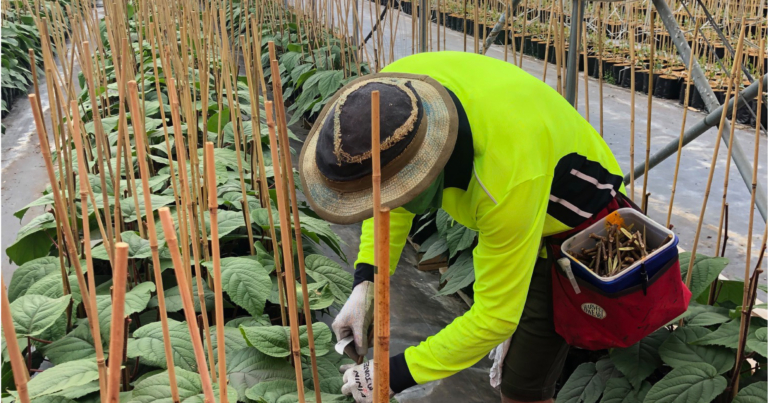
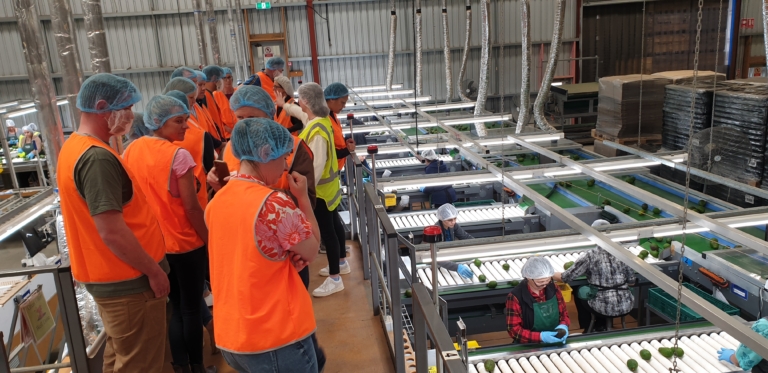
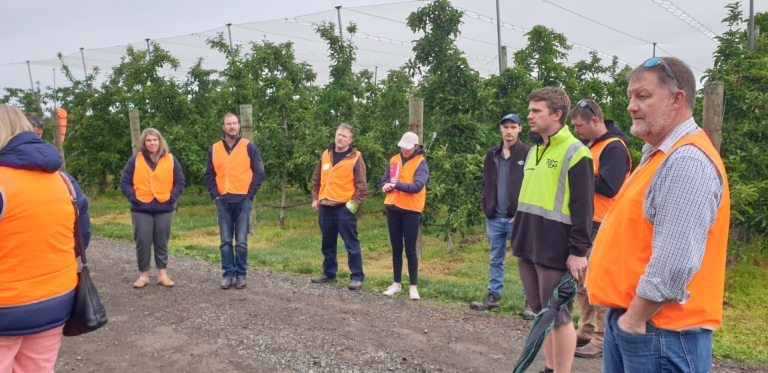
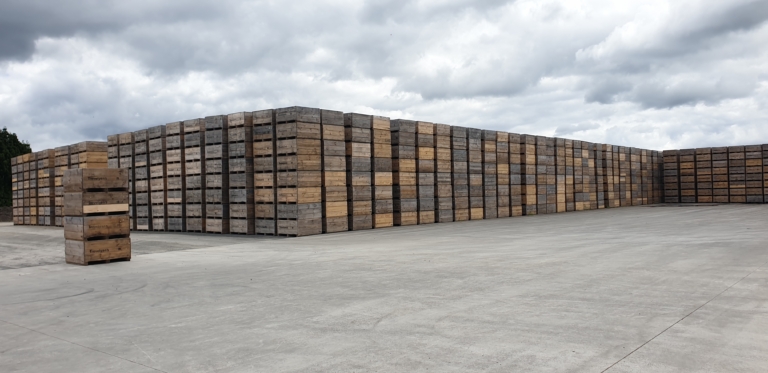
15.11.23
Day 4 – Jesamine:
We started the day with Plant and food research, who perform a critical service in protecting our horticultural industries like Zespri. They have a pioneer research team working on taonga foods. I’ll share about this at a future date. So exciting!
We then left for Trevelyan, who are a legacy NZ company that’s been around for eons. Time critical performance schedules for grading, sorting and packing, to get produce exported to their international market.
Then we had the pleasure of a walk through an A Class nursery, Southern Cross Horticulture. An awesome set up that’s got so much to offer in specialist knowledge for growing Kiwifruit.
Additional field notes:
Day four, continued the kiwifruit value chain. First stop – the Kiwifruit Breeding Centre, a collaboration between Plant and Food Research and Zespri. KBC finds out what growers need in a cultivar and then deliver through accelerated research.
Then onto the Te Puke based Trevelyan’s, an independent, family-run, single-site kiwifruit and avocado packhouse – and NZ’s largest. It has a 50+ year history and has family values woven through all facets of the operation.
Southern Cross Horticulture – orchard developers, cropping and orchard management. We saw a perfectly constructed system, consistently delivering the perfect plant.
Finally to Pāmu’s Wairakei Estate to complete the dairy value chain. We heard from senior leadership on Pāmu’s dairy beef, organic dairy, winter milking, A2 and deer milk, and pastoral business mix, as well as an extensive sustainability strategy on all 112 Pamu farms.
16.11.23
Day 5 – Jesamine:
Today I broke my ‘beer drinker virginity’ with a tall glass of Gizzy Gold! Thank you Gerard and Jason from First Light for treating the local pub as your classroom 😀. By embracing a real world approach, (the course) allows us as participants to get up close and personal with export industry leaders, in their mix and mingle comfort zones, which in NZ is the local pub.
However, before we got to the pub, we visited Lochinver, a huge farm with huge stock numbers. The value chain here is commodity based, which is very different from that of First Light.
Aside from livestock, I can see huge potential in the land itself here, and the still untapped natural resources of native plant seed harvesting and propagation, and gourmet food developed from wild Canadian Geese. The geese are a pest here, that could add economic value as meat. However, that would require a shift in mindset which may not suit their current customer focus.
So what I learned from First Light is that different value chains will have a different focus depending on who they identify as their customers, which can be at different ratios for customer groups, with strategies to cater to each of those customer groups.
Additional field notes:
“We’re driven by growth, but by growth in value.” Jason, First Light Foods.
Jesamine:
Being able to forecast how the dynamics in the make-up of that customer group will change over time is key to longevity. Looking after every step of your product’s journey from farm gate (nursery) to the customer, while never losing your “story” and point of difference, is also a skillset NZ is leading in, but can always improve on.
Additional field notes:
“I’d rather stab myself in the stomach than lose a point of difference.” Jason, First Light Foods.
Jesamine:
The journey from Lochniver to Napier took our team through Eskdale Valley, where a colleague walked us through the disaster as she experienced it. What we saw, the impact on the land, the homes and the lives of locals was incredibly sobering. To say that the people here are resilient is an understatement.
Upon reaching Napier, prior to meeting the owner operators of First Light, we had the privilege of meeting Gourmet Direct, who BBQ cooked delicious samples of Rose Veal for us, and believe me, it’s to die for! It’s the one thing that both Gourmet Direct and Zespri got right. They both show-cased their product for us to taste test. That’s a mark of confidence that’s earned each of them a 10/10 in my book.
I loved Kate and Perry’s “who and why” story for their value chain. The success of it will be significantly influenced by how well that story is communicated both locally and internationally. (I shared an idea. I hope they use it).
Additional field notes:
Lochinver Station kicked off day five on the Value Chain Innovation Programme. 13,000ha’s of mostly sheep and beef finishing.
Next stop was one of New Zealand’s first direct to consumer online perishables retailers, Gourmet Direct. Owned line, Rose Veal, sees animals raised in pasture to 8 Months. No hormones, antibiotics or palm kernel are fed.
First Light Foods’ founders hosted an inspiring discussion at Havelock North’s Giant Brewery. First Light continues to show how to produce the highest quality grass-fed wagyu and farm-raised venison.
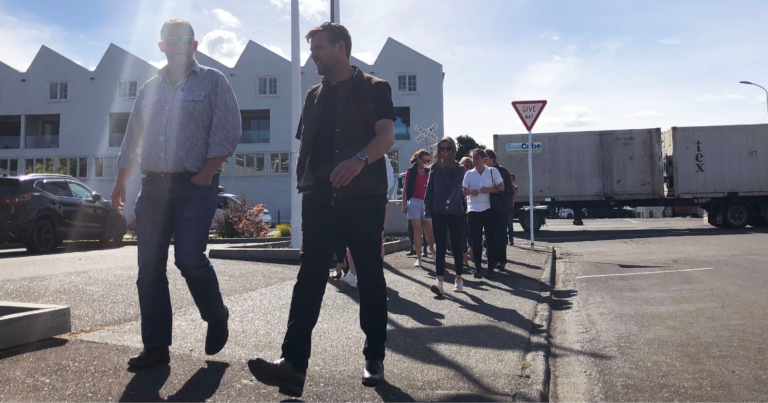
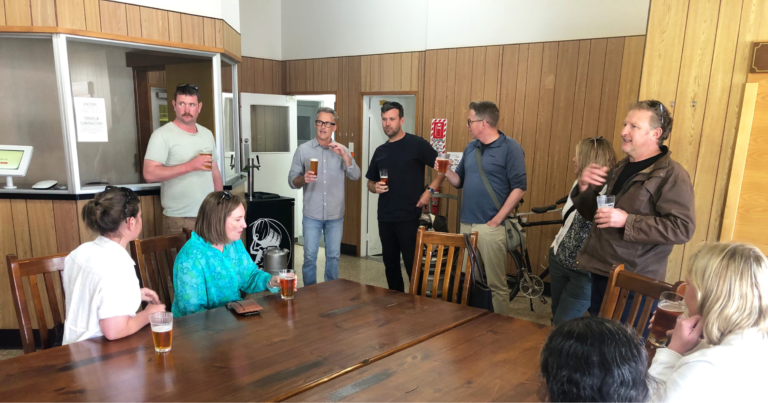
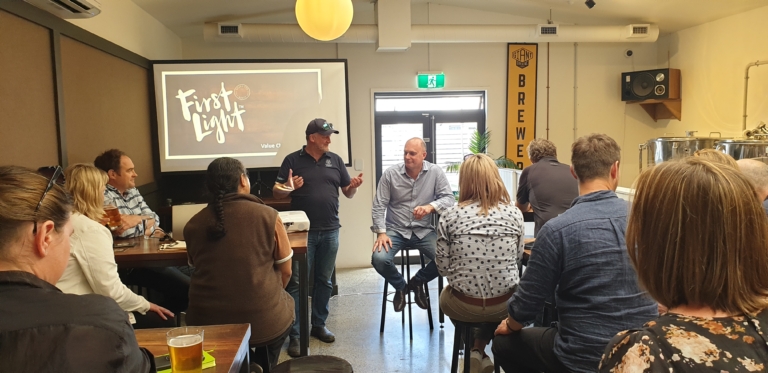
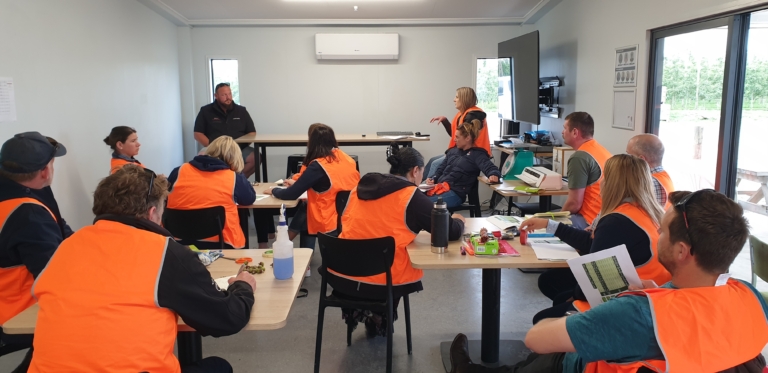
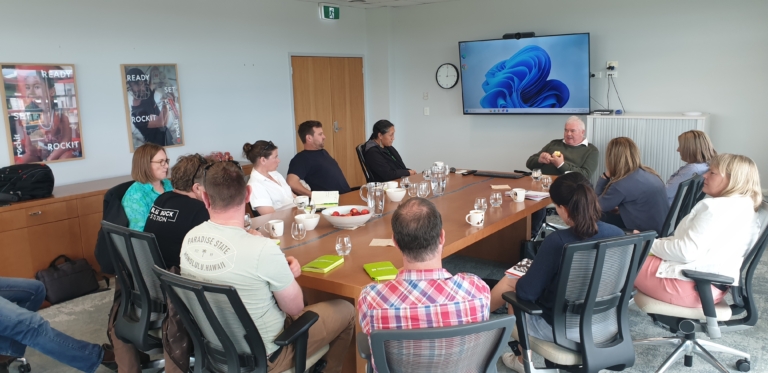
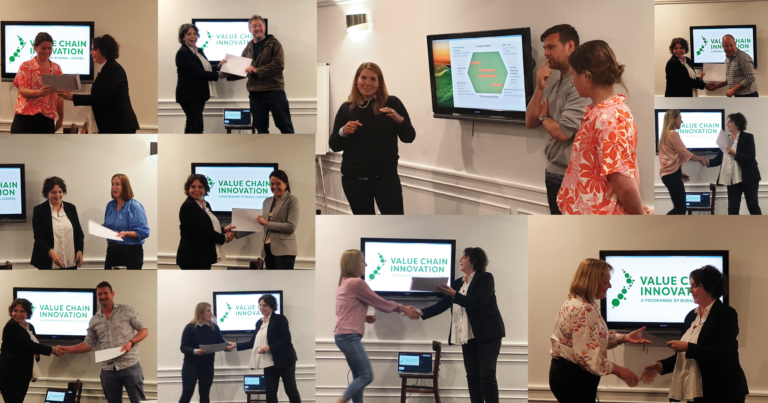
17.11.23
Day 6 – Jesamine.
Today we visited Turners & Growers, Rockit and Mr. Apple. So in a nutshell, apples were the food of choice for the day. We also were introduced to a newly created beer, one of my course colleagues produced. I’ll wait until he launches it first though, before I mention the name. My Dad would absolutely love it.
We saw the differences in the value chain models employed by each of NZ’s top apple growing companies. We also touched on the impact of Climate-change, Covid, Delta, War, Government, and building human capacity, and how that looks for each group.
I met people today, who are not just international superstars in the horticultural and agricultural space, I also witnessed trail blazers passing on the torch to a group of passionate, driven and motivated visionaries – my colleagues. It’s humbling to meet local NZ giants, who understand the international market place so well, they can put you at ease, while describing their story in a way that makes it easy to digest.
There were times I could enjoy bite-size pieces, and there were times I knew I just had to live in the moment and absorb whatever I could. The thing I felt grateful for, was that the way they told their story allowed me to feel I was sharing in it. The quality and callibre of leadership in the room amongst my colleagues, meant that I was learning from the questions they asked and the answers we all received as a result.
I hope they in turn, were able to take away something from the answers to my questions. I’m really proud of all our NZ apple exporters. Thank you for your commitment to lifting our country’s economic future up to where it needs to be on the world stage. Tautoko!
My last point, is that the style of teaching in this course, requires you to have an appetite for the market place, regardless of what your focus is in your given industry. You can’t wait to be spoon fed. You have to be proactive, to stretch yourself – at times painfully – outside your comfort zone. That in itself, is a very important characteristic in the market place, which changes shape often. Adapt or die is a loud enough message here.
Fortune favours future-focused visionaries, who appreciate the value of our own authentic story, to share in a new way on the world stage for everyone to enjoy. It’s our point of difference, that makes us the premium product, and therefore the premium price point.
Additional field notes:
Day six, T&G Innovation Orchard. This vertically integrated continuous improvement model covers research, growing, sales and marketing.
Next was Rockit Global, where we spoke with one of New Zealand’s most experienced, accomplished, and humble sector leaders.
Rockit was a clever apple waiting for an idea to fall on it. And, the idea that landed turned out to be rather big; apples in a tube, sold at service stations – and a huge export earner too. It’s a story that “…neatly blends FMCG requirements with fruit realities.”
The final visit Mr Apple, export 25% of the New Zealand’s apple crop around the world and follow a philosophy of “…discipline not control…”
To end the day, programme participant Carlos Bagrie kindly shared the first pull of his fantastic new beer in the hi-tech brewery it was made in.
18.11.23
Day 7 – Jesamine.
The opportunity to see Craigmore Orchards today, was an experience that will stay with me for a long time. Simply because of the sheer size and scale of the operation. There are literally tons of apples taken from here to international markets, with most being IP branded to specific companies.
The fascinating thing about the apple industry, is the collaboration between growers supplying the market. Growers are both transparent and supportive of one another. Working together lifts the standard on both the domestic and international front, because best practice outcomes add value to the market’s perception of NZ apples as a “trusted source”. This perception of us as a trusted source, is what allows us to trade our NZ apples (in competition with other international growers like Chile 🇨🇱, USA 🇺🇸, etc.) at a premium price.
Our country’s leadership in the apple industry, regard people as a valuable asset to be invested in, developed, and up-skilled. The apple capital of NZ is Hawkes Bay, where staff retention can be a challenge. So this approach is pivotal to this industry’s survival and success. There are good success stories with migrant workers, which has benefitted our local retail in Hawkes Bay, and the families of these workers in the Pacific.
Out of all the apple brands out there, Rockit, Mr Apple and Turners & Growers lead in this space. Thank you everyone for your enormous generosity towards our group, who will one day be your future industry leaders.
Additional field notes:
The last day of the Programme – Craigmore Orchard, producing 2500 tonnes a year. The Orchard’s leader has a passion for people, “…along with locking up great IP … good social practices will be something that differentiates NZ Horticulture.”
The day ended with Lisa Rogers, Rural Leader’s CEO, and facilitators Hamish Gow and Phil Morrison chairing participant preso’s before a final dinner together.
A truly inspiring and informative value chain experience, where sharp ideas, insights, new connections and friendships have been made.
Good things.
Summary – Jesamine.
The Rural Leaders Value Chain Innovation Programme: If there is one word that springs to mind to describe this course, it would be “access”. Access to a wider vision for understanding the same landscape. Access to business models that can shift you from a business transaction to a business relationship with other entities. Access to incredible industry giants who I believe genuinely care about “our country”.
The second word is “relationships”. The wealth of “industry know how” across the horticultural and agricultural sectors became available to other course participants and I, because of the relationship “Rural Leaders” has with industry gurus in their field of expertise.
So then after having found access to these relationships, the question is now, “Where to from here?”
My experiences have re-shaped my vision. I arrived in this space believing I would discover a value model that I could take home, adapt and bend into a Maori framework to create a “Maori Rural Leaders Value Chain Programme” for Ngati Porou. What I realised by day 1, is that this approach would rob my own people of the huge value that is found in the interactions between Pakeha, Maori and Tauiwi course participants in this space.
The learning in these interactions is just as valuable as the knowledge gleaned from sitting face to face at the table with industry experts, and the mentoring by course leaders.
Although my Koro, Ben Wanoa was a farmer, as was his father Rev. Matauru Wanoa, I myself had no experience of farming other than to feed Papa’s chooks as an 8 year old from the wool-shed platform. Listening to the calibre of questions issued by my Pakeha colleagues working in dairy and beef, to CEOs, Chairpersons, Managers and the like, gave me a greater appreciation of their huge concern for the horticultural and agricultural industries in Aotearoa-NZ.
There were also Ngai Tahu women leaders present as course participants, whose skill and expertise were wonderful to witness. I believe my own questions and answers had some impact, even if I hadn’t intended to challenge the CEO of Rural Leaders.
When I was asked, “What do you think is the biggest impediment to Maori accessing this course?” I plainly answered, “Money. I have heard my Pakeha colleagues share about the very real hardships they have faced with Covid, weather events, government and industry bodies. If they’re operating at 60% with all they have access to, then my people who have no access, are operating at 40% or less.
We can’t say NZ’s the best in the world if we’re operating at 40/60. We’re only the best when we’re all operating at 100% in total. To get there we can’t operate as ‘them’ and ‘us’ on the world stage. There has to be just ‘us’ if we’re going to compete as a country against international competitors. The 100% lift we’re looking for with resource allocation, must be right across the sector to get prime product status for all of NZ. Rural Leaders are acting on this.

Rachel Baker – via LinkedIn.
Last week I toured the North Island exploring NZ food sectors on the Value Chain Innovation Programme delivered by Rural Leaders and facilitated by Hamish Gow from Lincoln University.
This is a truly outstanding programme. Learning as a group from each other, while being connected with the leaders, innovators and rockstars of businesses in dairy, red meat, kiwifruit, apple and logistics, and doing a deep dive into each.
It continually struck me over the week that as a food producing nation, we trade on trust. Trust in relationships (many buyers were customers of 20+ years), the quality of product (rigorous grade standards, consistency), how it is produced (sustainability, transparency) and who produces it (farmers and growers behind the product). Trust must ultimately reach and deliver to what our customer wants. Customer-led value chains knew their customer profile intimately.
Taste was talked about a lot. “People buy with their eyes. Marketing will get you the first sale, but taste will ensure you get the repeat customer.” We put this to the test with Zespri SunGold, Rockit apples, Rose veal and a soon-to-be released craft beer.
Other observations were that while NZ’s seasonality plays to our farmer/grower strengths, on the flipside it has the potential to erode value with uncontrolled volumes and inconsistency of product.
Capitalisation of some value chains is needed to manage future planned volume increases, and to fund innovation and technology advancement – in a capital constrained environment, where will this come from, and how will it be prioritised?
Every value chain required more highly skilled and trainable people. Those with seasonal staff celebrated and individualised them, which is not often highlighted when politicised. Our education system needs to be geared to advance our primary sector, yet some tertiaries are reducing their focus on ag/hort, science and food…
Much “thought for food” and “food for thought”…!
Thank you to all who generously hosted our tour group and to Nuffield NZ for giving me a thought provoking and inspiring opportunity.
Follow Jesamine Wanoa on LinkedIn here.
Follow Rachel Baker on LinkedIn here.
Register your interest in the next Value Chain Innovation Programme here.

















